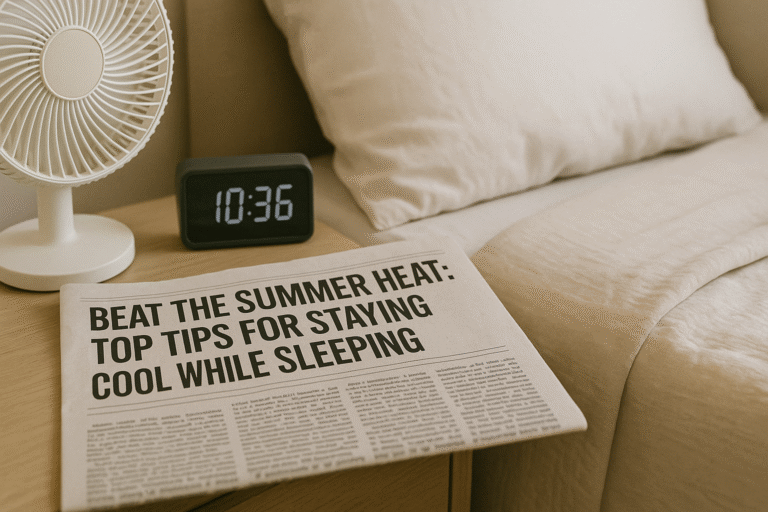
Summer nights can be a challenge when it comes to getting a good night’s sleep. High temperatures and increased humidity often make it difficult to fall asleep or stay asleep, leaving many of us tossing and turning throughout the night. Fortunately, there are several strategies you can employ to keep cool and ensure a restful slumber. In this blog post, we will explore a number of effective techniques to beat the summer heat and enhance your sleep quality.
One of the most straightforward ways to create a cool sleeping environment is by optimizing airflow in your bedroom. Using a fan can be an economical and effective solution. Ceiling fans are particularly advantageous, as they circulate air throughout the room, creating a cooling effect. If you do not have a ceiling fan, a pedestal or table fan placed strategically can also help. For added coolness, try placing a bowl of ice or a frozen water bottle in front of the fan. This will help circulate cooler air as the ice melts. Alternatively, if you own an air conditioning unit, set it to a comfortable temperature just before bedtime to pre-cool your room.
Another essential factor in staying cool at night is choosing the right bedding. Opt for lightweight, breathable materials such as cotton or linen that allow for better air circulation. These materials naturally wick away moisture, which is crucial for those hot, humid nights. Consider using a summer duvet or, if you find even that too warm, a thin sheet. Memory foam mattresses can trap heat, so if you have one, investigate cooling mattress pads or toppers as an added layer to help regulate your body temperature.
Your choice of sleepwear also plays a significant role in keeping you cool throughout the night. Light, loose-fitting pajamas made from natural fibers like cotton or bamboo are ideal. They will not only enhance ventilation but also aid in moisture wicking. Avoid synthetic materials like polyester that can trap heat and exacerbate sweating. Some brands even offer specialized cooling sleepwear designed to provide a more comfortable sleep by regulating temperature and enhancing breathability.
Hydration is another critical aspect when it comes to maintaining a comfortable body temperature. Drinking a glass of cold water before bed can help lower your core temperature. However, it’s important not to overhydrate, as frequent trips to the bathroom can disrupt sleep. During the day, aim to consume plenty of fluids to keep your body well-hydrated. Also, keep a glass of water by your bedside in case you wake up feeling parched.
Strategically cooling specific areas of your body can also aid in achieving a more comfortable sleep. Applying a cold compress or ice pack to pulse points like your wrists, neck, or ankles can quickly lower your body temperature. Alternatively, using a damp washcloth on these areas can have a similar effect. Additionally, a quick, lukewarm shower before bed can help lower your body temperature and make you feel more comfortable when you slip between the sheets.
If you live in an area where nights are cooler, consider taking advantage of this by ventilating your home in the early evening. Open windows to let in the cool air, allowing your home to reduce in heat naturally. Once the temperature drops further, keep the cooler air inside by closing windows before you go to bed. If security or allergies are a concern, utilizing window fans or air purifiers equipped with HEPA filters can help maintain airflow while keeping allergens and unwelcome intruders at bay.
The strategic use of curtains or shades is another valuable tool in managing indoor temperatures. During the day, keep curtains or shades closed to block out direct sunlight, which can significantly raise the indoor temperature. Blackout curtains are particularly effective in keeping your bedroom cooler by preventing external heat from entering.
Electronics and lighting can also impact the temperature of your sleep environment. Electronics such as computers, televisions, and even cell phones can generate significant amounts of heat. Turn off or unplug these devices when not in use, particularly in the evening, to minimize their heat output. Similarly, energy-efficient LED bulbs emit less heat compared to traditional incandescent bulbs and can help keep your room cooler.
A vital, though often overlooked, component of achieving a cool summer slumber is developing a consistent sleep schedule. Aim to go to bed and wake up at the same time each day, even on weekends. This consistency helps regulate your body’s internal clock and can improve your overall sleep quality, making it easier to cope with nightly heat challenges.
Incorporating practices to reduce stress and encourage relaxation before bed can also be beneficial. High levels of stress can increase your body temperature, making it more difficult to fall asleep. Consider integrating calming routines such as gentle yoga, meditation, or deep-breathing exercises into your nightly ritual to promote relaxation and prepare your body for sleep.
For those who find it particularly challenging to sleep during the summer months, considering room modifications might be worthwhile. Installing reflective film on windows can help reduce heat absorption, while a dehumidifier can decrease humidity levels, making the air feel cooler. If you have the option, consider relocating to a cooler room in the house for the summer months. Lower levels, such as basements, often maintain a lower temperature than upper floors due to the rising of heat.
Finally, your diet can also play a role in how well you manage the heat at night. Avoiding large meals and spicy foods close to bedtime can prevent an increase in body temperature. Instead, opt for lighter options like fruit or yogurt. Consuming foods with a high water content, such as watermelon or cucumber, can also aid in hydration and keep you cool.
In conclusion, while sleeping during the hot summer months can pose a challenge, these various strategies offer practical solutions for maintaining a cool and comfortable sleep environment. By paying attention to airflow, bedding, clothing, hydration, and relaxation techniques, you can significantly improve your sleep quality despite the heat. Remember, achieving restful sleep is not just about comfort—it’s crucial for your overall health and well-being. So take the necessary steps to beat the summer heat and enjoy a more serene and refreshing night’s rest.



